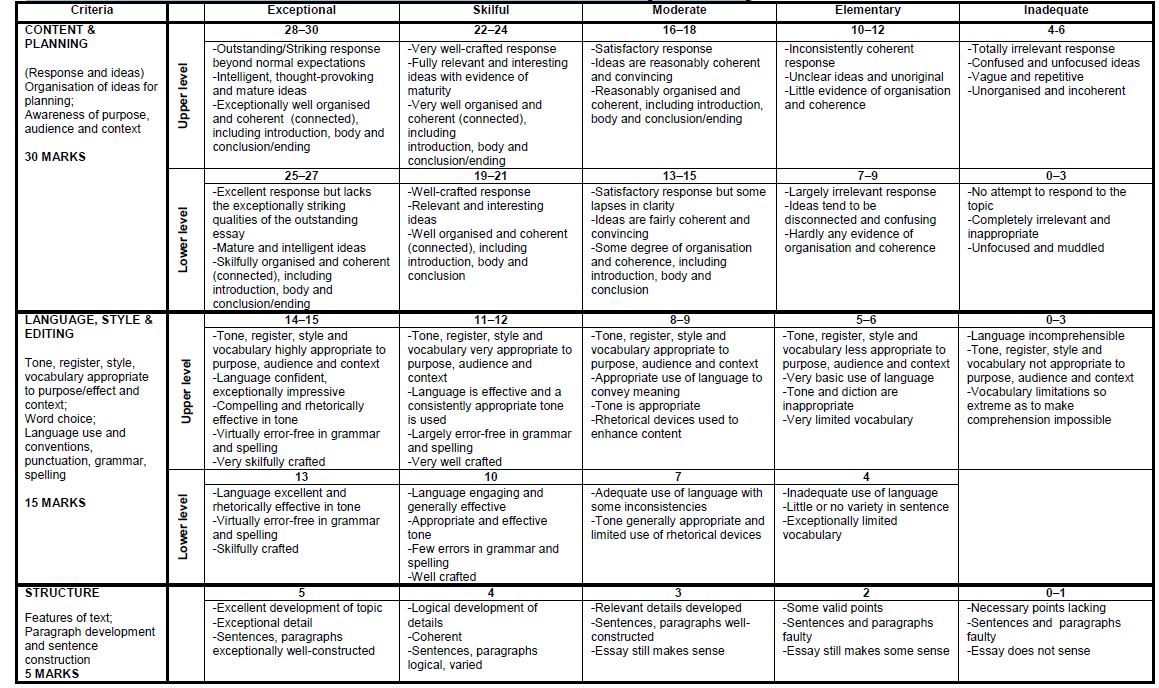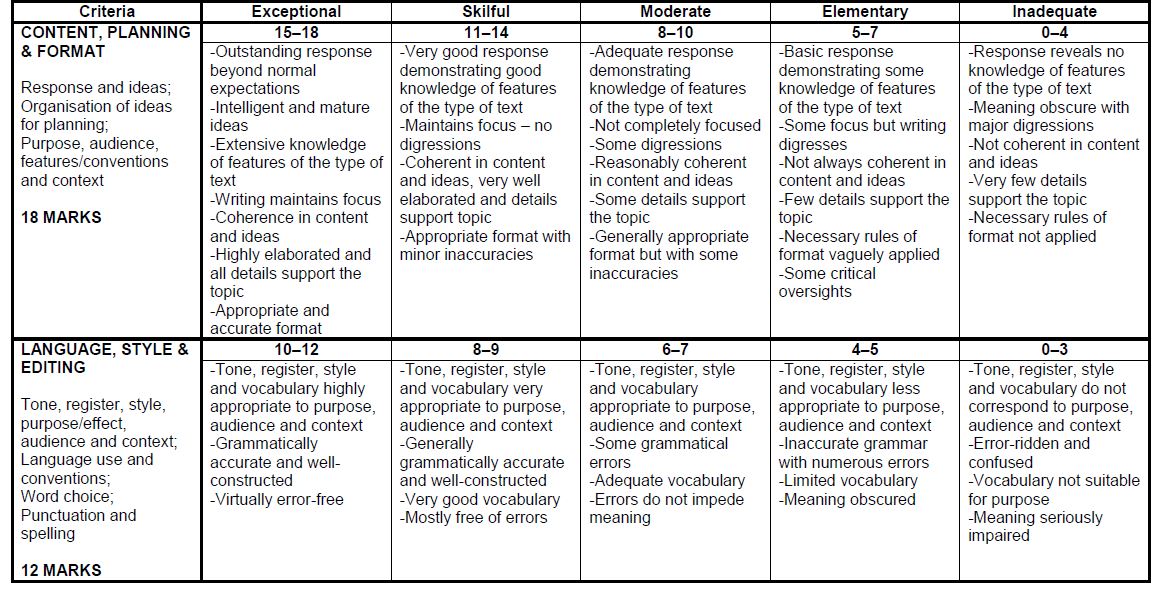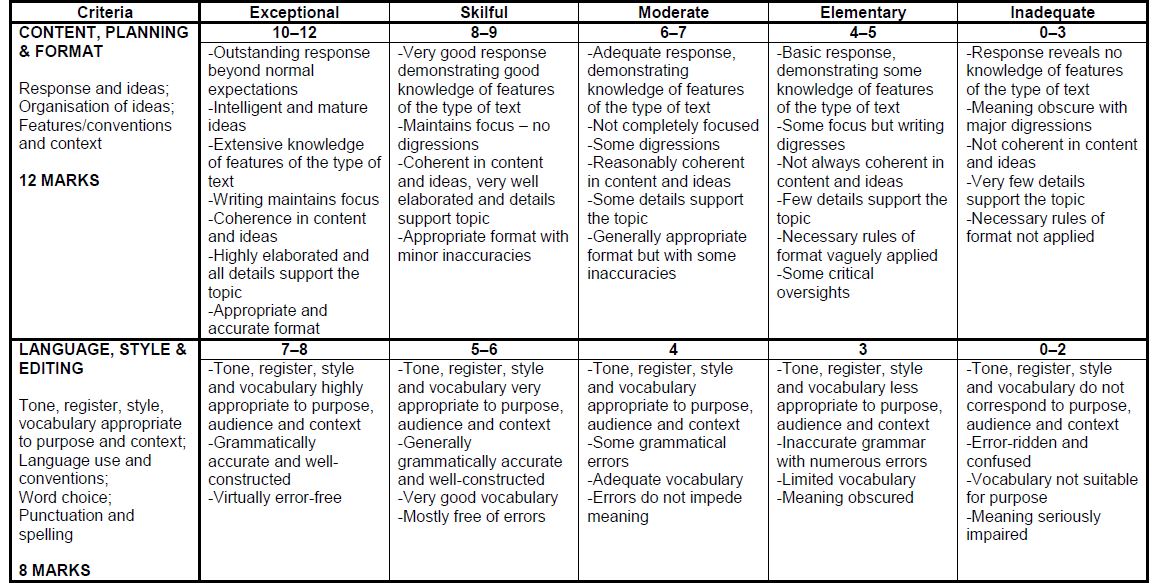ENGLISH FIRST ADDITIONAL LANGUAGE PAPER 3 GRADE 12 MEMORANDUM - NSC EXAMS PAST PAPERS AND MEMOS MAY/JUNE 2021
Share via Whatsapp Join our WhatsApp Group Join our Telegram GroupENGLISH FIRST ADDITIONAL LANGUAGE PAPER 3
GRADE 12
NATIONAL SENIOR CERTIFICATE EXAMINATIONS
MAY/JUNE 2021
INSTRUCTIONS AND INFORMATION
These marking guidelines must be used together with the attached English FAL assessment rubrics for SECTIONS A, B and C.
SECTION A: ESSAY
QUESTION 1
Instructions to Markers:
- Candidates are required to write on ONE topic only.
- The ideas listed below the topics are only some ways in which the topic could be interpreted.
- Full credit must be given for the candidate's own interpretation.
- Marking must be objective. Give credit for relevant ideas.
- Use the 50-mark assessment rubric to mark the essays. The texts produced by candidates must be assessed according to the following criteria as set out in the assessment rubric:
- Content and planning (30 marks)
- Language, style and editing (15 marks)
- Structure (5 marks)
NOTE:
- Adhere to the length of between 250 and 300 words as prescribed in the CAPS document. However, should the maximum word count be reached mid-sentence, read to the end of that sentence.
- No additional penalties may be imposed as the rubric itself imposes penalties.
1.1 As I reached home …
Narrative/Descriptive/Reflective
- If narrative, the essay must have a strong story line and an interesting ending.
- If descriptive, the candidate should create a picture in words, using as many senses as possible to make the description clear.
- If reflective, the essay should convey the writer's/candidate's reactions and feelings.
NOTE: A candidate may write an essay which contains elements of more than one type of essay/any other essay type, relevant to the topic. [50]
1.2 We lifted the trophy with pride.
Narrative/Reflective/Descriptive
- If narrative, the essay must have a strong story line and an interesting ending.
- If reflective, the essay should convey the writer's/candidate's reactions and feelings.
- If descriptive, the candidate should create a picture in words, using as many senses as possible to make the description clear.
NOTE: A candidate may write an essay which contains elements of more than one type of essay/any other essay type, relevant to the topic. [50]
1.3 Rainy days
Descriptive/Narrative/Reflective/Argumentative/Discursive
- If descriptive, the candidate should create a picture in words, using as many senses as possible to make the description clear.
- If narrative, the essay must have a strong story line and an interesting ending.
- If reflective, the essay should convey the writer's/candidate's reactions and feelings.
- If argumentative, the essay must reflect a specific argument or viewpoint for or against the topic. The candidate should give a range of arguments to support and substantiate his/her view. The conclusion should be a strong, clear and convincing statement of the writer's opinion.
- If discursive, the arguments for and against must be well-balanced and clearly analysed in the essay. The candidate must provide supporting evidence for his/her arguments. The candidate may come to a particular conclusion at the end of the essay, which should include recommendations.
NOTE: A candidate may write an essay which contains elements of more than one type of essay/any other essay type, relevant to the topic. [50]
1.4 You are never too old to dream a new dream.
Argumentative/Discursive/Reflective/Narrative/Descriptive
- If argumentative, the essay must reflect a specific argument or viewpoint for or against the topic. The candidate should give a range of arguments to support and substantiate his/her view. The conclusion should be a strong, clear and convincing statement of the writer's opinion.
- If discursive, the arguments for and against must be well-balanced and clearly analysed in the essay. The candidate must provide supporting evidence for his/her arguments. The candidate may come to a particular conclusion at the end of the essay, which should include recommendations.
- If reflective, the essay should convey the writer's/candidate's reactions and feelings.
- If narrative, the essay must have a strong story line and an interesting ending.
- If descriptive, the candidate should create a picture in words, using as many senses as possible to make the description clear.
NOTE: A candidate may write an essay which contains elements of more than one type of essay/any other essay type, relevant to the topic. [50]
1.5 It is the responsibility of every individual to save the environment.
Argumentative/Discursive/Descriptive/Reflective/Narrative
- If argumentative, the essay must reflect a specific argument or viewpoint for or against the topic. The candidate should give a range of arguments to support and substantiate his/her view. The conclusion should be a strong, clear and convincing statement of the writer's opinion.
- If discursive, the arguments for and against must be well-balanced and clearly analysed in the essay. The candidate must provide supporting evidence for his/her arguments. The candidate may come to a particular conclusion at the end of the essay, which should include recommendations.
- If descriptive, the candidate should create a picture in words, using as many senses as possible to make the description clear.
- If reflective, the essay should convey the writer's/candidate's reactions and feelings.
- If narrative, the essay must have a strong story line and an interesting ending.
NOTE: A candidate may write an essay which contains elements of more than one type of essay/any other essay type, relevant to the topic. [50]
1.6 'My best friend is one who brings out the best in me.' – Henry Ford
Reflective/Narrative/Descriptive/Argumentative/Discursive
- If reflective, the essay should convey the writer's/candidate's reactions and feelings.
- If narrative, the essay must have a strong story line and an interesting ending.
- If descriptive, the candidate should create a picture in words, using as many senses as possible to make the description clear.
- If argumentative, the essay must reflect a specific argument or viewpoint for or against the topic. The candidate should give a range of arguments to support and substantiate his/her view. The conclusion should be a strong, clear and convincing statement of the writer's opinion.
- If discursive, the arguments for and against must be well-balanced and clearly analysed in the essay. The candidate must provide supporting evidence for his/her arguments. The candidate may come to a particular conclusion at the end of the essay, which should include recommendations.
NOTE: A candidate may write an essay which contains elements of more than one type of essay/any other essay type, relevant to the topic. [50]
1.7 Interpretation of pictures
The candidate:
- must give the essay a suitable title.
- may interpret the pictures in any way.
- may choose to write any type of essay.
- must link the interpretation to the picture.
- may write in any appropriate tense.
1.7.1 Picture: From birth to old age
Narrative/Descriptive/Reflective/Argumentative/Discursive
- Literal interpretations: from birth to old age, the different stages of life, life experiences.
- Figurative interpretations: Life is a journey, life and death, youth versus old age. [50]
1.7.2 Picture: Birds in flight
Narrative/Descriptive/Reflective/Argumentative/Discursive
- Literal interpretations: birds, migration, nature.
- Figurative interpretations: unity, leadership, emigration. [50]
TOTAL SECTION A: 50
SECTION B: LONGER TRANSACTIONAL TEXT
QUESTION 2
Instructions to Markers:
- Candidates are required to answer ONE question.
- Marking must be objective. Give credit for relevant ideas.
- Use the 30-mark assessment rubric to mark the responses in this section. The texts produced by candidates must be assessed according to the following criteria as set out in the assessment rubric:
- Content, planning and format (18 marks)
- Language, style and editing (12 marks)
NOTE:
- Adhere to the length of between 120 and 150 words as prescribed in the CAPS document. However, should the maximum word count be reached mid-sentence, read to the end of that sentence.
- No additional penalties may be imposed as the rubric itself imposes penalties.
2.1 FRIENDLY LETTER
A letter to a cousin.
- The letter should have an introduction, a body and a conclusion.
- The tone and register of the letter should be friendly and informal.
- The following aspects of format must be included:
- Address of sender
- Date
- Greeting/Salutation
- Suitable ending
- The candidate must encourage his/her cousin to enrol for these lessons.
- The candidate may express his/her opinion about the benefits of enrolling for these music lessons. [30]
2.2 COVERING LETTER
A letter of application for the position of salesperson.
- Acceptable variations of the format must be allowed.
- The letter must be addressed to the manager of Fashion For You.
- The tone and register of the letter must be formal.
- The letter must include an introduction, a body and a conclusion.
- The following aspects of format must be included:
- Address of sender
- Date
- Recipient: The Manager
- Name of the clothing store
- Address of recipientGreeting/Salutation
- Subject line
- Suitable ending
- Signature and name of sender
- The content of the letter must match the CV provided.
- The content of the letter may include the following details, among others:
- Position being applied for
- Relevant personal qualities which make the applicant suitable for the position
- The date when the applicant will be available to assume the position being applied for
- An indication that the CV is attached. [30]
2.3 REVIEW
Film review
- The tone and register should be appropriate for the target audience.
- The content must be suitable for viewing by people of all ages.
- The following information should be included in the review, among others:
- The title of the film
- A description of plot, main characters and key incidents
- A judgement or evaluation/rating of the film
- Some of the following may be included:
- Genre/setting/style/lighting/camera angles
- Director/Producer of the film
- Accept different formats of the review. [30]
2.4 SPEECH
A speech to inspire Grade 12 learners.
- The speech should be written using a suitable salutation/greeting.
- The tone and register should be appropriate for the audience.
- The speech must include the following:
- An introduction that captures the listener's attention
- Well-developed points
- A suitable conclusion. [30]
TOTAL SECTION B: 30
SECTION C: SHORTER TRANSACTIONAL TEXT
QUESTION 3
Instructions to Markers:
- Candidates are required to answer ONE question.
- Marking must be objective. Give credit for relevant ideas.
- Use the 20-mark assessment rubric to mark the responses in this section. The texts produced by candidates must be assessed according to the following criteria as set out in the attached rubric:
- Content, planning and format (12 marks)
- Language, style and editing (8 marks)
NOTE:
- Adhere to the length of between 80 and 100 words as prescribed in the CAPS document. However, should the maximum word count be reached mid-sentence, read to the end of that sentence.
- No additional penalties may be imposed as the rubric itself imposes penalties.
3.1 INVITATION CARD
An invitation to a family reunion.
- The response may be in the form of a note, a personal letter or an invitation card.
- The following aspects of format must be included:
- Date
- Venue
- Time
- Type of function should be clear.
- Language may be formal/informal.
- Full sentences are not necessary.
- The following details may be included, among others:
- Name of invitee
- Dress code
- RSVP
NOTE: Do not award marks for illustrations or drawings. [20]
3.2 DIARY ENTR
The candidate's feelings about being selected to participate in a national choir competition.
- There MUST be ONE diary entry.
- The date/time must be reflected.
- The entry must express the candidate's feelings after hearing about being selected to participate in the choir competition.
- The diary entry must be written in the first person.
- The language must be simple and informal.
- The tone must reflect suitable emotions.
[20]
3.3 INSTRUCTIONS
Instructions on how to take care of an ill grandparent.
The instructions:
- May be in point or paragraph form.
- Must be in a logical sequence.
- Must be written in the imperative. [20]
TOTAL SECTION C: 20
GRAND TOTAL: 100
ASSESSMENT RUBRIC FOR ESSAY – FIRST ADDITIONAL LANGUAGE [50 MARKS]
ASSESSMENT RUBRIC FOR LONGER TRANSACTIONAL TEXT – FIRST ADDITIONAL LANGUAGE [30 MARKS]
ASSESSMENT RUBRIC FOR SHORTER TRANSACTIONAL TEXT – FIRST ADDITIONAL LANGUAGE [20 MARKS]


